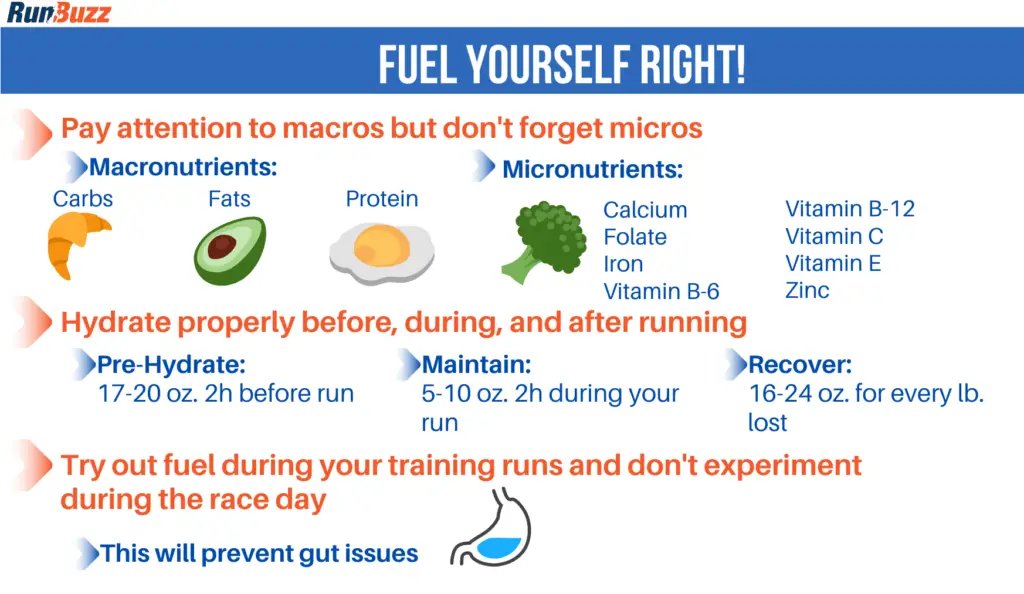There are no secret formulas or shortcuts to becoming a better runner. It’s all about hard work, consistency, and developing new useful habits.If you want to become a highly effective runner, beat your personal record, tackle a new race distance, or simply lose some weight, it’s vital to cultivate habits of successful runners.In this article, I’ve covered 7 habits of successful runners that will help stay healthy and motivated, improve endurance, train consistently, and achieve your running goals. Happy Running!
1. Run for Yourself

The happiest of runners don’t run for anything but personal reasons. Whether it’s for that feeling of exhausted contentment after a completed long run, the euphoria of the “runner’s high,” or better overall health, every successful runner runs for their own reasons and doesn’t let anything else slow them down.
As a soldier in the United States military, I often have to run for a physical fitness test or, in what the military terms, a “fun run,” which does not include fun for anyone involved. I hate “military running”, but I love a good long run when I’m able to run for my own reasons, at my own pace, and until I am physically spent but happy. Own your runs.
2. Fuel for Success

One of the most important habits of a successful runner is consciously fueling to maximize each workout. This may mean consuming carbohydrate-laden food two hours before a long run, making sure you have the appropriate fuel to consume halfway through your run, or ensuring that you’re adequately hydrated before you start your run. Some of my best long runs happened when I woke up at 5 am to consume 40-50g of carbohydrates before a 7am run. As a runner, you need to find out what works best for you and then make it happen every time.
Read also: The Basics Of Endurance Fueling – How To Use Gels, Wafers And Sport Beans
3. Put Bad Runs/Races Behind You

Every runner is going to have a bad day. This could mean a bad training run due to sickness, a combination of humidity and dehydration, or being in an over-trained state. Or it might show up in the form of a less than maximal race day when you’re not fully prepared for weather conditions.
Successful runners realize that these days happen, no matter how well you plan. The key is to learn what you can from any mistakes, throw the rest away, and move on.
About seven miles into my second half-marathon, I started experiencing more knee pain than I ever had before. What’s worse is the pain intensified with each mile. I survived the last 2-3 miles of the race by alternating between running and walking and finally finished. I didn’t end up with a PR (personal record), but I was happy to have completed it. I put the bad race behind me and, after knee surgery, two weeks later, worked to train and run my next half marathon even faster, finally achieving that PR.
Read also: How To Get Over a Bad Run
4. Get Back Up When Life Knocks You Down

It doesn’t matter how well you train, fuel, or plan – life is going to knock you down at some point with unexpected changes, injury, sickness, or events. The successful runner learns to let these life situations play out, works on rebuilding the necessary physical, spiritual, or mental strength, and then jumps up and back into the race when the time is right. Life may knock you back or even down, but you don’t have to stay down.
My last year or so has involved five surgeries, the most recent just a week ago. While the surgeries have slowed me down a little and my mileage hasn’t been as high, I continue to battle to get back on the trail after each one. Your challenges may be physical, financial, or mental, but be patient and get back into the game as soon as life allows. Resilience is the hallmark of a successful runner.
Read also: An Introduction To Mental Training And Mindset For Runners – Part I
5. Embrace the Discipline of Consistency

A successful runner runs. You may be thinking, “Thanks, Captain Obvious,” but running consistently is important, whether you want to train for a specific distance or desire to maintain a precise level of fitness. If you’re training for a specific distance race, you’ll need to run several times a week and work on slowly increasing your mileage by adding a little distance each week to your long run. To increase your speed to achieve a PR in a specific distance, you would add a speed workout to your weekly training. The point is that, to achieve any of these things successfully, you need to train consistently for the goal you have in mind.
When I first started training for a half marathon, the thought of running 13.1 miles in one shot seemed a little overwhelming. However, as I stayed consistent with my weekly training and my long runs got longer, I gained confidence that 13.1 miles were not going to be a problem. And it wasn’t. Instead, I was able to enjoy running the distance and do it comfortably at a faster pace than I ever thought I could maintain.
Read also: How To Boost Your Willpower And Become A More Consistent Runner
6. Know How to Motivate Yourself

When you first start running, there’s a lot of things that can motivate you. Maybe it’s the excitement of signing up for your first race or maybe it’s that new pair of running shoes or GPS watch that you got for your birthday. But, at some point, the novelty wears off. Inevitably the day comes when – horror of horrors! – you have absolutely no desire to run. The problem is, you’re training for a race and you need that run to stay on schedule with your training.
Learn what motivates you both long term and short term and use that to maintain consistency when your body tries to convince you to take extra time off. Of course, you should listen to your body when it comes to sickness or injury, but, when you know the problem is mental, use motivational tricks to get yourself moving. Sometimes, just getting yourself out the door and on the trail is all it takes to get past mental roadblocks.
Honestly, there have been a few times when the thought of a nice toasted bagel and coffee at the end of a long run was what kept me going when all my body wanted to do was quit.
Read also: Training For Your First 5K, Part 2: Staying Motivated
7. Cross-Train

As a runner, you really can’t run all of the time. Well, some people can. But, for most of us, running every day is not as practical as mixing in a couple of cross-training days with our weekly running schedule. Most physical trainers agree that cross-training is important for runners to build strength and agility, helping you to be a stronger and more efficient runner. Cross-training has numerous benefits for the runner including injury prevention, greater overall fitness, better motivation, and the ability to rehab injuries safely.
I typically cross-train 3-4 days/week, adding in weight training to help build strength and ice skating to work my running muscles in a different way. If I’m rehabbing from an injury or sickness, I often incorporate cycling to keep me from losing too much cardiovascular fitness while I’m unable to run. Consider cross-training to make your running even stronger than it is now.
Read also: 7 Cross-Training Activities for Runners
- About the Author
- Latest Posts

Steve Carmichael is a running coach, sports performance coach, nutrition coach and has been a recreational runner for over 18 years. Steve holds multiple certifications as a certified running coach through the RRCA and USA Track and Field as well as he is a NASM certified personal trainer, and PN1-L1 certified nutrition coach.
Steve has been coaching since 2010 and has helped thousands of runners online and in the Central Ohio area maximize performance and run injury-free.
Steve is the founder of RunBuzz and Run For Performance.com. If you are interested in working with Steve though his online running and strength coaching services, feel free to reach out.

